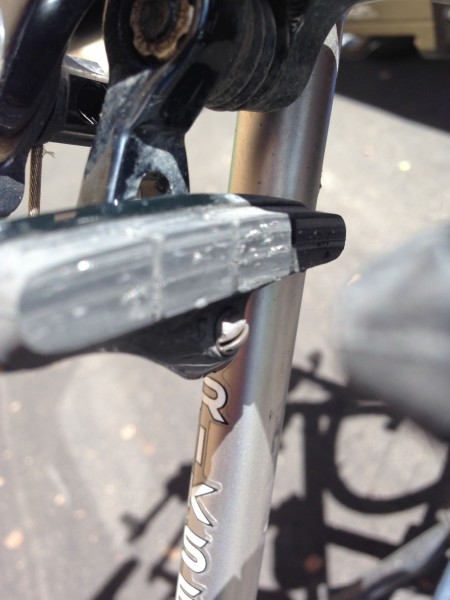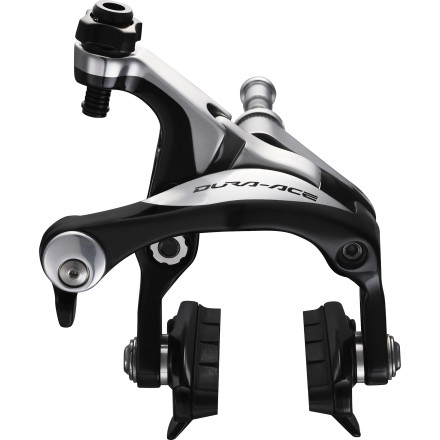I’m a little timid about going real fast downhill here in the mountains right now. I’m about 1000% better than I was even a couple weeks ago. I was a little worried that I had lost my shit, but I’m pretty sure that isn’t the case now.
That being the said, I have to say that the braking over the years has changed a ton. And it has mainly changed for the worse. Racing in big groups, with descents, the lack of braking and the fright in the field, is sometimes a little contagious. So, it’s sort of a additive scare.
I think the braking got a lot worse when Shimano went from 8 speed to 9 speed. The brake calipers themselves were slimmed down for weight purposes, making them much more flexie than before. It was hard getting a good amount of front brake, scrubbing speed quickly. It was so bad, I took off my front 9-sp caliper and used an 8-sp one for Redlands.
The 10 zip calipers were about the same, pretty squishy. Added to that is that carbon rims became common. Carbon makes the braking very unreliable. It really depends upon what brake caliper you’re using, brake pad compound, ambient temperature, precipitation, etc.
Precipitation is a big deal here. Like Tom Boonen says here, you sort of loose some braking power when it is wet. I don’t think it is 50%. I think it is initially a lot, then when you get some of the water off the rim, it tends to grab.
The link above has a bunch of Euro road pros talking about the use of disc brakes in the peleton. I think that Peter Stetina, newphew of Shimano’s Wayne Stetina, brings up the most valid concerns. He has an inside scoop on it, plus I’m sure he’s sort of an equipment geek like his uncle. I agree, it’s going to be a while before they figure out how to get disc brakes to work in professional racing. Just the wheel change problems seem monumental. The different rotors up for each and every bike will be difficult.
The new Dura Ace brake calipers are much, much better than the previous editions. I don’t know if it’s the calipers themselves or the brake pad compound. I think it is a combination of the two. But, whatever the reason, the new brakes are better, much better than they’ve had for years. No need to put on SwissStop or cork pads. They stop pretty great, on aluminum or carbon rims.
Yesterday, I rode over to Vail and back from Silverthorne. My brakes had been grabbing before, so I cleaned my rims of any chain lube that might be there. Anyway, they weren’t working good all day. When I got back to Silverthorne, I looked at my pads and they had a bunch of rim metal embedded in them. I haven’t had that problem for a while now. I’m riding Ultergra 11 sp wheels. I think the rims are Scandium, but I”m not positive about that. Whatever the deal, I don’t much like the metal in my pads. It screws up the braking and wears the rims out much quicker. Especially changing back and forth between carbon and aluminum.
We’ve all got used to worse and worse braking through the years. I’m not sure the definitive answer to the braking issues that have come up recently in the sport. I don’t think disc brakes are the answer. And if you’re going to be racing on carbon rims, then you have to expect less predpredictability.







Steve, I just slapped a new pair of Shimano 11 speed alloy wheels and brake pads on my bike last week. Turned around after 5 miles and headed home, the braking performance was absolutely miserable and I could see the metal flaking off the rim and into the pads immediately. Maybe a Shimano rim problem you experienced?
Signore Slater, I make a suggestion to you anda to Steve. Ring my friend in Italia. He have a many solution for you guys. He is called Valentino Campagnolo. Ciao!
Use aluminum rims from Campagnolo or Mavic and you will love the breaking performance.
Personally I luv my Tektro mini-Vs. No need for anything else imho.
The latest Dura Ace brakes are much better then the last two DA versions I’ve run.
My Shimano pads have looked similar to that one pretty regularly. I have a big safety pin I use to pick out the metal – not after every ride but maybe once a week. It does suck and it happens on Shimano rims and HED scandium that I have used. I haven’t had it happen on the Mavic rims I am using right now. I think once the flaking gets going it keeps going so you have to keep the pads clean and the rims smooth. I use one of those rubber cleaner blocks Excel sells to clean up the rims. That thing and some effort or braking a few hard times on wet rims usually polishes up the rims nicely.
I find that my 7800 calipers are much better than my 7700’s, and almost as good as my old 7403’s
I’ve never gotten into carbon wheels. I do all my racing on “old school” hand built wheels.
.
Are your wheels “old school” because they’re hand built or some other reason?
Many if not most of the high end CF wheels are hand built, I have several sets of ENVE rims, both on and ofroad setups that I built. Not sure if that qualifies them as “old school” but the CF rim brakes, even with ENVE pads, are not up to par with the “old school” Mavic GL330s/et al as far as stopping goes.
Disc CF wheels are the schitz, spin up fast, stop fast.
A big concern with disc brakes on road bikes is the danger of possibly having a disc rotor slice someone’s leg open, cut their head open, etc. in the event of a pileup during a race. Just imagine the possibilities…
Shimano pads have been notorious for picking stuff bits of metal off rims since I started riding in the 80s.
The answer has always been ‘run aftermarket pads.’
The 6800 calipers on my bike now don’t seem to be picking up nearly as much metal with the stock pads. The D/A calipers on the other bike have SwissStop pads and stop very, very well.
YMMV
M
I like the argument” if discs are dangerous, what about pointed chain rings?”
When I say “old school”, I mean “old school”.
An assortment of 32 hole front and backs, built up with GL330’s and Wolbers.
I believe that the Wolbers are the same rims that Steve used, when he rode for the Icy-Hot team, back in the stone age. Mike F. had bunch of them left over from that team, and I bought enough to keep me in rims until I retire.
.
Probably a non-issue. Chainrings are sharper and more exposed and there ain’t many problems stemming from those.
Disc rotors are pretty dull and while yes, they could cut, the chances are pretty small.
If we were so worried about safety in cycling, we’d send out riders in football pads and full-face helmets.
Wow, there’s a blast from the past! I haven’t had flakes of aluminum stuck in brake pads since back-in-the-day of single-pivot Campagnolo brakes. I’ve heard stories about weak braking with Shimano brakes for years but don’t have much experience, though I do remember a Shimano-equipped bike I used a few years ago had what I thought were rather weak brakes, but not really horrible. I truly thought those issues a thing of the past, though I must admit to not being a fan of Campagnolo’s latest “skeleton” brakes – the calipers seem more flexy and harder to modulate overall than their older, beefier cousins.
Steve i think you should give the new discs a try Wayne let me try them when i was riding with him in colorado in june… i think for the mountains they offer some considerable added safety … you know we aren’t getting any younger.
Mafac Competition 2000 calipers and Super Champion rims. That’s Old School.
If you want crappy braking, use Shimano AX calipers and any hard-anodized rim.